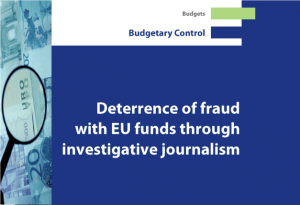A study on European investigative journalism focusing on fraud with EU money is being prepared for publication. The study, ‘Deterrence of fraud with EU funds through investigative journalism’, will be presented in the European Parliament in early October and promises to be an interesting read for anyone involved in investigative journalism in the EU. Here's a taste of what's in store.
BRUSSELS - A study on European investigative journalism focusing on fraud with EU money is being prepared for publication. The study, ‘Deterrence of fraud with EU funds through investigative journalism’, will be presented in the European Parliament in early October and promises to be an imperative read for anyone involved in investigative journalism in the EU. Here is a taste of what's in store.
Despite the fact that the euro crisis has now been rumbling on for years, investigative journalism into fraud, mismanagement and corruption with European taxpayers’ money remains low on the media’s agenda. Dutch investigative journalist Margo Smit coordinated the study for the European Parliament antifraud committee. Smit and her fellow researchers argue that civil society organizations and the media are essential in order to create a climate that discourages fraud and corruption and stimulates good governance. Despite this, there is hardly any international investigative journalism covering the implementation of European policy or inappropriate allocations of EU funds.
“The excuse given by the media and journalists is that they don’t see these European stories. They don’t have the knowledge, the data is hidden, there is no money, no time and they say their readers just aren’t interested,” says Smit. However, she argues that this kind of investigative journalism should be much more of a priority in view of the current European crisis.
For their part, European institutions and politicians should face greater pressure to provide proper answers to the critical questions posed by journalists and citizens. There needs to be more stringent application of legislation on open governance. Investigative journalism that transcends national borders can help to create more transparent decision-making, improved access to documentation and increased uniformity of European data.
European institutions also need to make greater efforts to protect whistle-blowers and journalistic sources. They need to guard press freedom and diversity more effectively. Europe can also assist by providing financial support for international cooperation between journalists. Smit: “If you ensure that there are sufficient firewalls to guarantee independent reporting, the EU can play a useful role in promoting European investigative journalism.”
This article was published in the September 2012 edition of The Free Pr€ss, a publication of the European Greens.
The interview with Margo Smit that appears in the same publication is also available on Journalismfund.eu.
